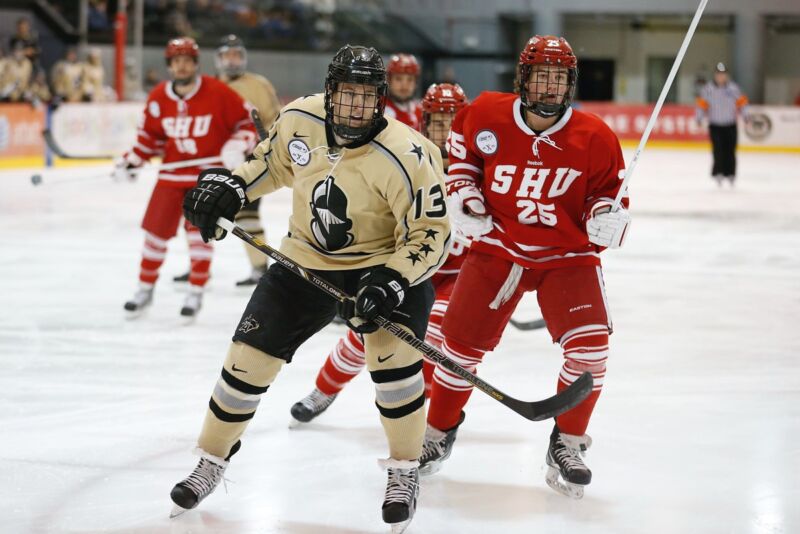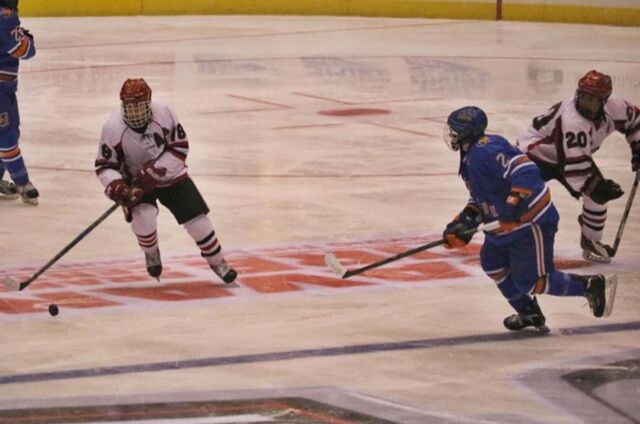
College of Rochester linguist Andrew Bray began out learning the evolution of the trademark sports activities jargon utilized in hockey for his grasp’s thesis. As an illustration, a hockey area is a “barn,” whereas the puck is a “biscuit.” When he would inform individuals in regards to the mission, nevertheless, they saved asking if he was making an attempt to find out why American hockey gamers sound like “pretend Canadians.” Intrigued, Bray determined to shift his analysis focus to seek out out if hockey gamers did certainly have distinctively Canadian speech patterns and, in that case, why this may be the case.
He found that US hockey gamers borrow sure facets of the Canadian English accent, notably in the case of hockey jargon. However they do not comply with the everyday guidelines of pronunciation. In brief, “American hockey gamers will not be making an attempt to shift their speech to sound extra Canadian,” Bray stated throughout a press briefing. “They’re making an attempt to sound extra like a hockey participant. That is why it is most evident in hockey-specific phrases.”
It is a idea generally known as a “linguistic persona,” a method of speaking how one identifies—on this case, as a hockey participant— by means of speech. Bray gave a discuss his analysis as we speak at a gathering of the Acoustical Society of America in Ottawa, Canada, held at the side of the Canadian Acoustical Affiliation.
Bray first had to determine find out how to design a examine to look at this query. “What does it even imply to sound like a ‘pretend’ Canadian?” he stated. The stereotypical Canadian speech patterns are well-known: saying “out” as “oot,” for instance, or “about” as “aboot,” to not point out including a questioning “eh?” on the finish of sentences. Based on Bray, there are three frequent linguistic variables typical of Canadian English.
One is known as the decrease again merger shift, which includes decreasing the tongue to pronounce the vowels in phrases like “bit” (ih), “wager” (eh), and “bat” (ah). The second is known as Canadian elevating, during which the physique of the tongue is raised to pronounce the vowels in phrases like “tight” and “doubt.” Lastly, there are the vowels in phrases like “bait” and “boat.” Canadians pronounce these vowels with just one configuration of the tongue, generally known as a monophthongal pronunciation. (If the tongue strikes to a secondary configuration, that may be a diphthongal pronunciation.)
Bray thought the American gamers may be exhibiting some Canadian English variables of their speech however to totally different levels, such that their pronunciations sounded only a wee bit off—i.e., “pretend.” He opted to deal with the monophthongal part since he thought these pronunciations have been prone to be probably the most prevalent in “pretend Canadian” speech amongst US hockey gamers.

College of Georgia Ice Dawgs
Subsequent, Bray needed to construct his personal “corpus of hockey participant speech” targeted on American-born hockey gamers. That required intensive interviews with gamers. Skilled Nationwide League Hockey (NHL) gamers won’t have the time to take part, so he targeted on the American Hockey League (AHL) and East Coast Hockey League (ECHL), narrowing his pool to 4 groups: the Charlotte Checkers, the Greenville Swamp Rabbits, the Rochester Individuals, and the South Carolina Stingrays.
Bray performed hockey for the College of Georgia Ice Dawgs, which helped him shortly set up a rapport together with his topics over their shared curiosity and get them speaking at size about their hockey profession trajectories. Amongst different advantages, it helped him keep away from the dreaded “observer’s paradox,” during which asking somebody to speak about their speech makes them self-conscious and subtly adjustments how they’d usually speak. He collected information from 20 such interviews, performed between 2017 and 2019, every lasting about half-hour.
He then turned these interviews right into a database of “formants”—resonant frequencies that amplify some teams of harmonics above others in speech. Bray’s ASA presentation targeted on two frequent vowel formants. The primary formant (F1) roughly corresponds to tongue peak, whereas the second (F2) corresponds to how far ahead or retracted the tongue is throughout pronunciation.
Within the case of “bait”-like vowel sounds, Bray discovered some proof amongst his US hockey gamers of a monophthongal pronunciation (minimal tongue motion), as one would count on in Canadian English and maybe elements of the higher Midwest, however which might not in any other case be current in American English dialects. “Boat”-like vowel sounds appeared extra “pseudo-monophthongal” in nature. However when these have been in contrast with benchmark expectations for Canadian English F1 and F2 formants, US hockey gamers got here shut however fell only a bit in need of the mark. Nor are their pronunciations in keeping with commonplace American English dialects.
“This may be why they sound ‘pretend,'” stated Bray. “I am arguing that that is the development of a linguistic variant uniquely linked to hockey. It is influenced by Canadian English, however it’s not solely Canadian.” And the best way the US gamers in his dataset pronounced “hockey” appears to be “a wholly novel pronunciation of a phrase linked to this neighborhood.” Bray suspects this affect can be related to his preliminary analysis on hockey slang, anticipating to seek out that “hockey slang phrases are pronounced otherwise than you’d count on for the opposite non-hockey associated phrases.”
Bray suspects this occurs by way of some kind of “lexical diffusion.” On the junior league stage (round 14 to twenty years of age), US gamers won’t have these distinctive speech patterns, however their pronunciations might step by step shift over time the longer they play and decide up hockey slang phrases. The extra strongly they self-identify as hockey gamers, the extra they may sound like “pretend Canadians.”

